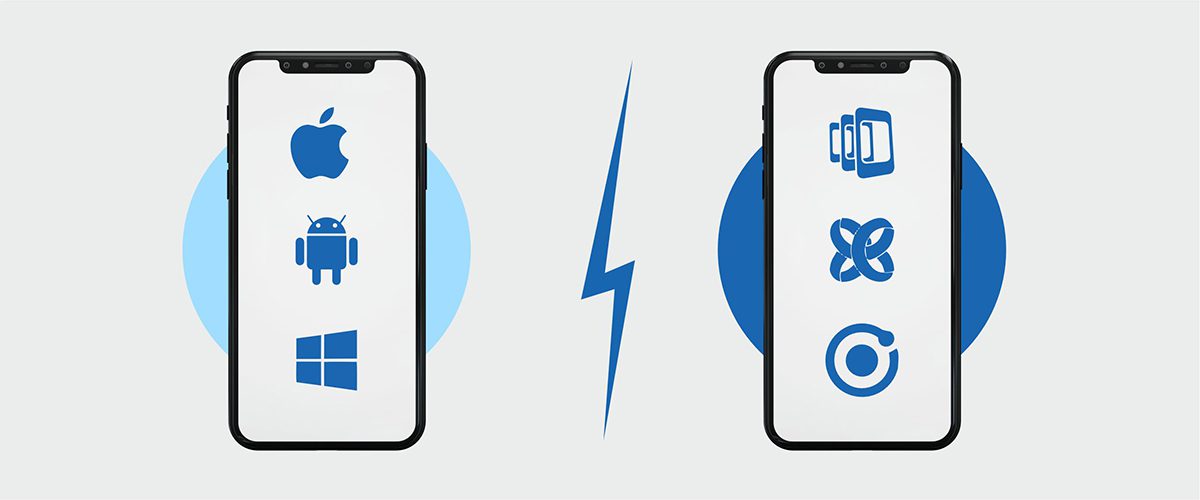Have you ever thought that what is the better app for your project? So, when it comes to the better or perfect app then no one size fits all solution for projects. So, to make the correct choice; so, let’s explore the features of native apps vs. hybrid apps and let’s compare their pros and cons.
In the ever-evolving landscape of mobile app development, making the right architectural choice is pivotal to creating a successful and user-friendly application. Two major contenders, native apps and hybrid apps, have been dominating the scene with their distinct approaches. In this blog post, we’ll delve into the depths of native apps vs. hybrid apps, exploring their differences, advantages, and considerations, helping you make an informed decision for your next app project.
What are Native Apps?
Native apps are developed specifically for a particular operating system, such as iOS or Android, using platform-specific programming languages like Swift for iOS and Java/Kotlin for Android. These apps are designed to leverage the full potential of the device’s hardware and operating system, resulting in optimal performance and user experience.
Advantages of Native Apps
- Seamless User Experience: Native apps offer an intuitive and seamless user experience. They follow the design guidelines and standards of their respective platforms, leading to higher user engagement and satisfaction. Users feel comfortable and familiar with the mobile app development trends interface, enhancing overall usability.
- Access to Native Features: Developers have direct access to the device’s native features and APIs, such as cameras, GPS, and sensors. This access empowers developers to create feature-rich and innovative apps that harness the full potential of the device.
- Offline Functionality: Many native apps can function without an internet connection. This offline capability enhances user experience, ensuring users can access content and perform tasks even in areas with limited connectivity.
Considerations of Native Apps
- Development Time and Cost: One of the key drawbacks of native app development is the time and cost involved. Building separate versions for different platforms (iOS and Android) can be time-consuming and expensive. It requires dedicated teams with expertise in the specific platform’s technology.
- App Store Approval: Submitting apps to app stores involves adhering to strict guidelines and policies. Any changes or updates might require separate approval for each platform, potentially leading to delays.
What are Hybrid Apps?
Hybrid apps are developed using web technologies like HTML, CSS, and JavaScript. They run within a native container that bridges the app’s web content and the device’s native features. This approach allows developers to create an app that can run on multiple platforms.
Advantages of Hybrid Apps:
- Code Reusability: A significant advantage of hybrid apps is code reusability. Developers can write a single codebase and deploy it across multiple platforms, saving development time and costs. This approach is particularly beneficial for resolving business problems using mobile app development.
- Faster Development: Hybrid apps can be developed more quickly compared to native apps, primarily because they use web technologies that many developers are already familiar with. This efficiency makes hybrid apps an ideal choice for projects with tight deadlines.
- Cross-Platform Reach: With a single codebase, hybrid apps can reach a broader audience by being available on multiple platforms. This wider reach can be advantageous for startups or businesses aiming to establish their presence across various devices.
- Easier Updates: Updating hybrid apps is often smoother. Changes can be pushed out seamlessly to users as they connect to the internet, eliminating the delay associated with app store approval processes.
Considerations of Hybrid Apps:
- Performance Trade-offs: While hybrid apps have come a long way in terms of performance, they might not match the seamless experience provided by native apps, especially for applications with complex graphics and animations.
- User Experience Challenges: Achieving a truly native-like user experience can be challenging for hybrid apps. UI components might not perfectly align with the native design of each platform, potentially affecting user satisfaction.
- Dependency on Plugins: Hybrid apps often rely on plugins to access device features. These plugins might not be as comprehensive or up-to-date as the native options, leading to limitations in functionality.
Choosing the Right Path
The decision between native apps vs. hybrid apps development ultimately hinges on your project’s scope, budget, timeline, and desired user experience. If your app demands peak performance and a platform-specific user experience, native development is the way to go. On the other hand, if you prioritize cost-effectiveness and faster development cycles, hybrid development offers an attractive solution.
In conclusion, both native apps vs. hybrid apps have their strengths and considerations. Understanding these differences is crucial for making an informed decision that aligns with your project’s goals. Whichever path you choose, a well-crafted mobile app can be a powerful tool in engaging users and driving your business forward.
 +91 141-4009009
+91 141-4009009 +1 (972) 215-7421
+1 (972) 215-7421

 USA - Dallas Registered
USA - Dallas Registered
 India Jaipur - Corporate
India Jaipur - Corporate